Critical Evaluation of Occupational Safety Training at NHS (MGT226)
VerifiedAdded on 2023/01/11
|12
|3674
|82
Report
AI Summary
This report provides a critical evaluation of occupational safety training strategies and programs implemented by the National Health Service (NHS) in the UK. The report begins with an executive summary, followed by an introduction outlining the purpose and objectives of the training programs, which aim to eliminate unsafe working conditions and control health-related hazards. The report identifies various training programs, including induction training, programs specific to organizational operations, and on-the-job training, and discusses the roles of PCBU, project and contract managers, and workers in ensuring occupational health and safety. The evaluation process used is described, followed by an analysis of the results and conclusions drawn from the evaluation. The report then offers recommendations for improving the training programs, emphasizing the importance of employee involvement and addressing potential hazards. The report highlights the significance of occupational health and safety training in maintaining a safe working environment, reducing workplace injuries, and improving the overall reputation and productivity of the organization. The report concludes by summarizing the key findings and recommendations for enhancing occupational safety training at NHS.
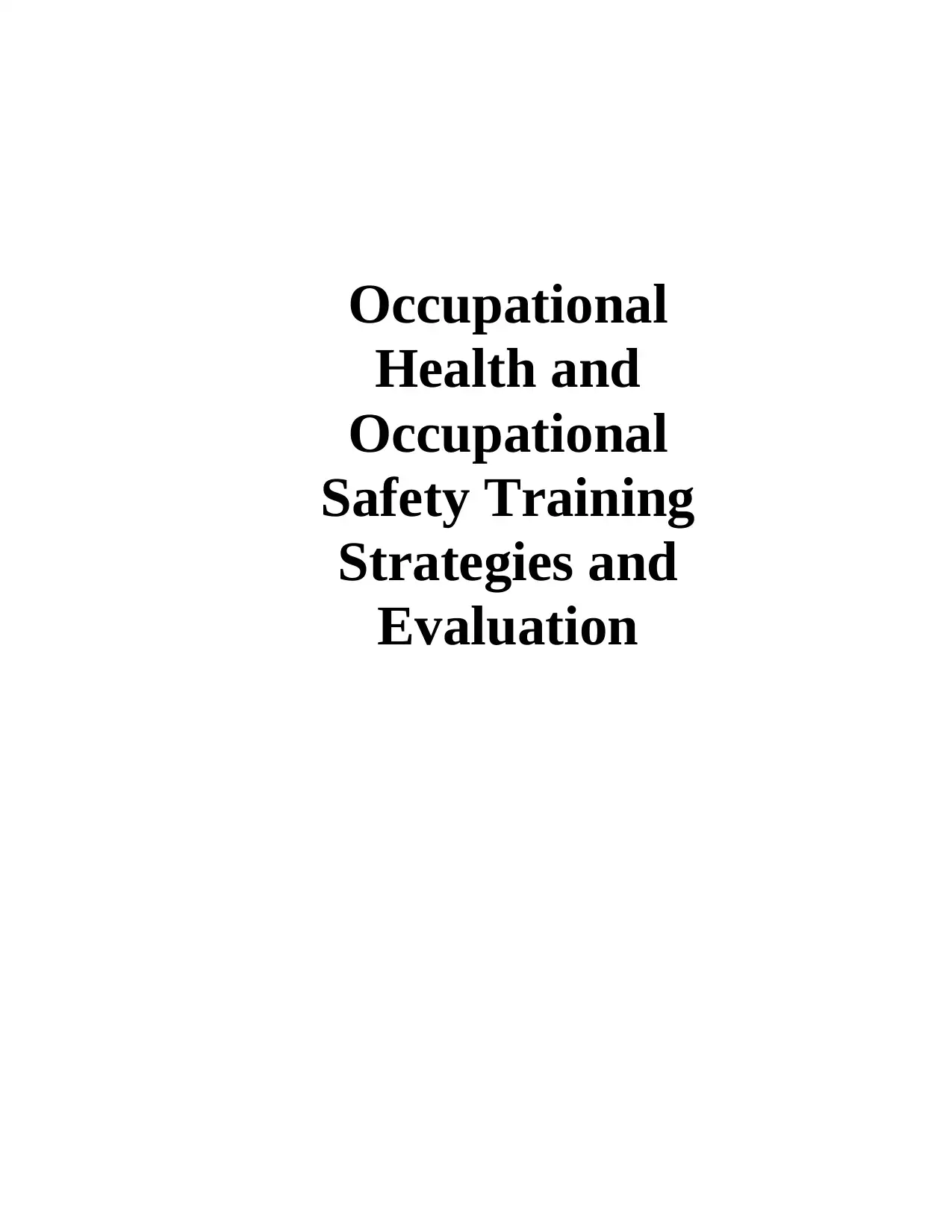
Occupational
Health and
Occupational
Safety Training
Strategies and
Evaluation
Health and
Occupational
Safety Training
Strategies and
Evaluation
Paraphrase This Document
Need a fresh take? Get an instant paraphrase of this document with our AI Paraphraser
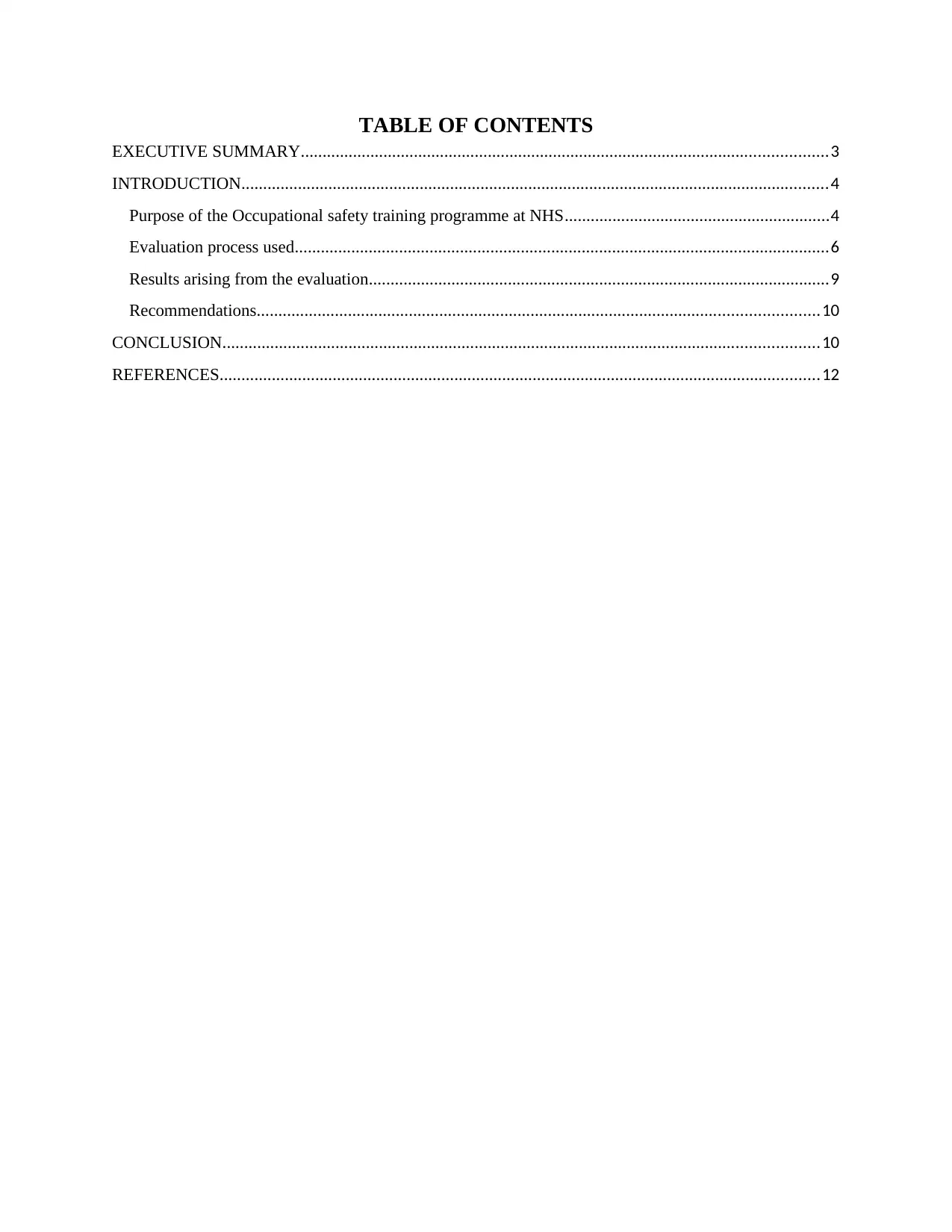
TABLE OF CONTENTS
EXECUTIVE SUMMARY.........................................................................................................................3
INTRODUCTION.......................................................................................................................................4
Purpose of the Occupational safety training programme at NHS.............................................................4
Evaluation process used...........................................................................................................................6
Results arising from the evaluation..........................................................................................................9
Recommendations.................................................................................................................................10
CONCLUSION.........................................................................................................................................10
REFERENCES..........................................................................................................................................12
EXECUTIVE SUMMARY.........................................................................................................................3
INTRODUCTION.......................................................................................................................................4
Purpose of the Occupational safety training programme at NHS.............................................................4
Evaluation process used...........................................................................................................................6
Results arising from the evaluation..........................................................................................................9
Recommendations.................................................................................................................................10
CONCLUSION.........................................................................................................................................10
REFERENCES..........................................................................................................................................12
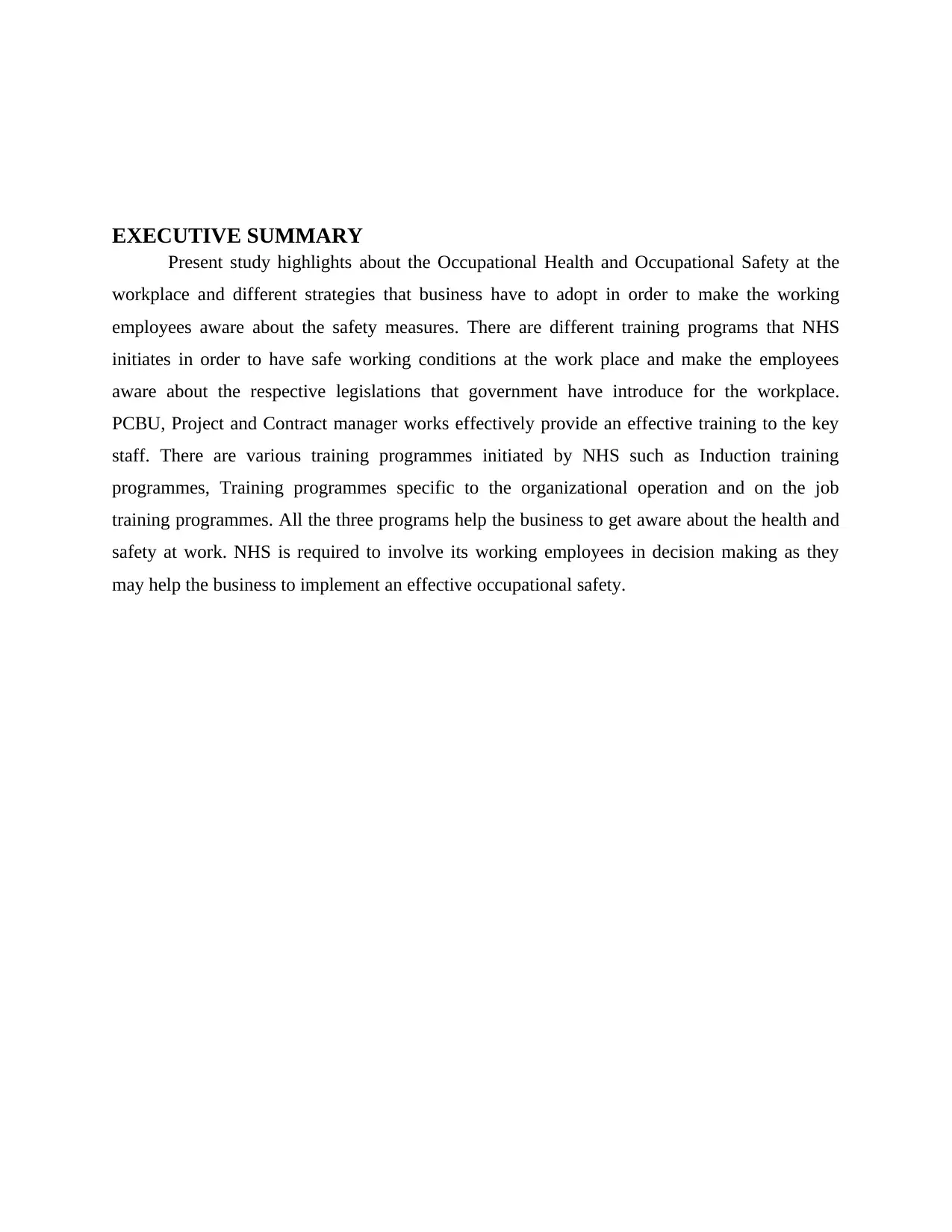
EXECUTIVE SUMMARY
Present study highlights about the Occupational Health and Occupational Safety at the
workplace and different strategies that business have to adopt in order to make the working
employees aware about the safety measures. There are different training programs that NHS
initiates in order to have safe working conditions at the work place and make the employees
aware about the respective legislations that government have introduce for the workplace.
PCBU, Project and Contract manager works effectively provide an effective training to the key
staff. There are various training programmes initiated by NHS such as Induction training
programmes, Training programmes specific to the organizational operation and on the job
training programmes. All the three programs help the business to get aware about the health and
safety at work. NHS is required to involve its working employees in decision making as they
may help the business to implement an effective occupational safety.
Present study highlights about the Occupational Health and Occupational Safety at the
workplace and different strategies that business have to adopt in order to make the working
employees aware about the safety measures. There are different training programs that NHS
initiates in order to have safe working conditions at the work place and make the employees
aware about the respective legislations that government have introduce for the workplace.
PCBU, Project and Contract manager works effectively provide an effective training to the key
staff. There are various training programmes initiated by NHS such as Induction training
programmes, Training programmes specific to the organizational operation and on the job
training programmes. All the three programs help the business to get aware about the health and
safety at work. NHS is required to involve its working employees in decision making as they
may help the business to implement an effective occupational safety.
⊘ This is a preview!⊘
Do you want full access?
Subscribe today to unlock all pages.

Trusted by 1+ million students worldwide
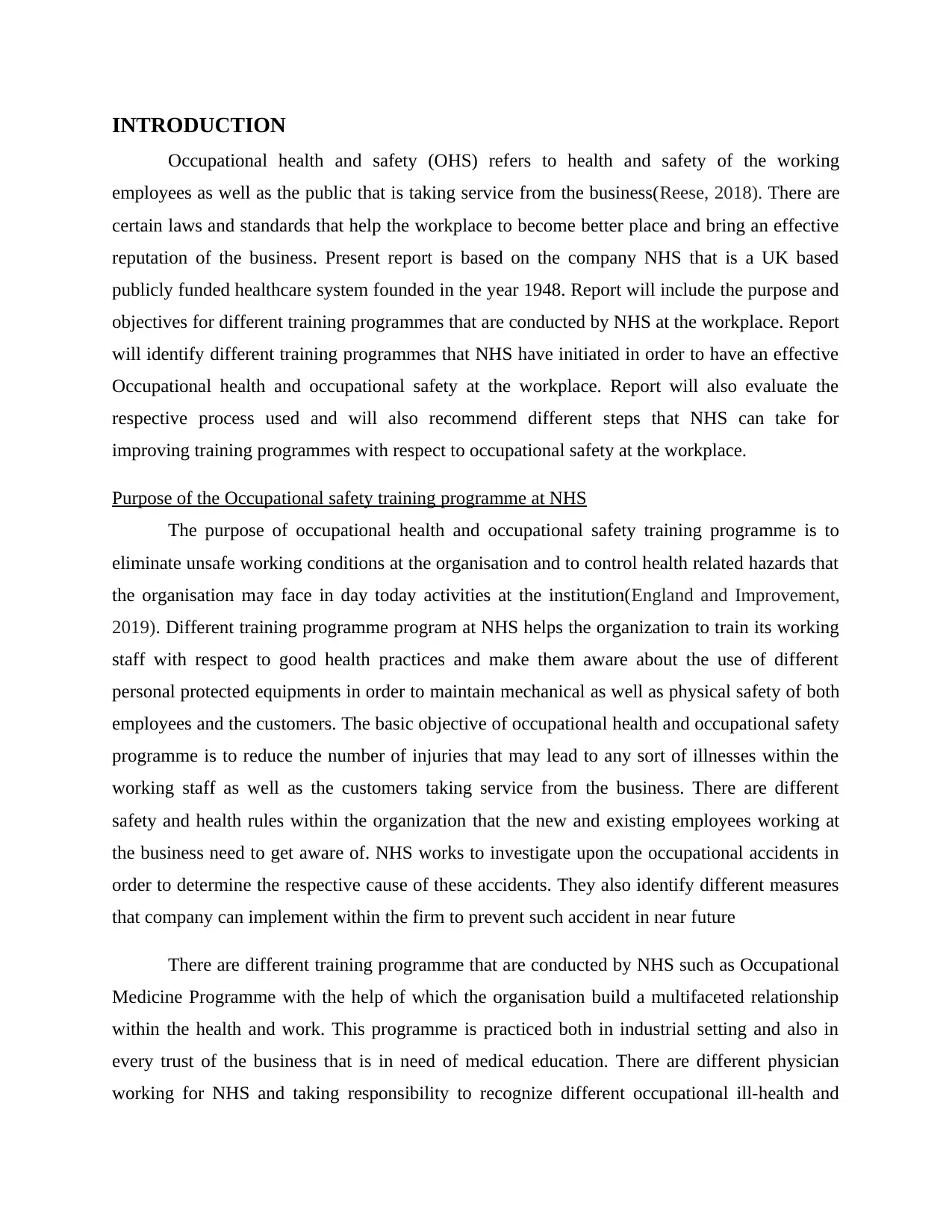
INTRODUCTION
Occupational health and safety (OHS) refers to health and safety of the working
employees as well as the public that is taking service from the business(Reese, 2018). There are
certain laws and standards that help the workplace to become better place and bring an effective
reputation of the business. Present report is based on the company NHS that is a UK based
publicly funded healthcare system founded in the year 1948. Report will include the purpose and
objectives for different training programmes that are conducted by NHS at the workplace. Report
will identify different training programmes that NHS have initiated in order to have an effective
Occupational health and occupational safety at the workplace. Report will also evaluate the
respective process used and will also recommend different steps that NHS can take for
improving training programmes with respect to occupational safety at the workplace.
Purpose of the Occupational safety training programme at NHS
The purpose of occupational health and occupational safety training programme is to
eliminate unsafe working conditions at the organisation and to control health related hazards that
the organisation may face in day today activities at the institution(England and Improvement,
2019). Different training programme program at NHS helps the organization to train its working
staff with respect to good health practices and make them aware about the use of different
personal protected equipments in order to maintain mechanical as well as physical safety of both
employees and the customers. The basic objective of occupational health and occupational safety
programme is to reduce the number of injuries that may lead to any sort of illnesses within the
working staff as well as the customers taking service from the business. There are different
safety and health rules within the organization that the new and existing employees working at
the business need to get aware of. NHS works to investigate upon the occupational accidents in
order to determine the respective cause of these accidents. They also identify different measures
that company can implement within the firm to prevent such accident in near future
There are different training programme that are conducted by NHS such as Occupational
Medicine Programme with the help of which the organisation build a multifaceted relationship
within the health and work. This programme is practiced both in industrial setting and also in
every trust of the business that is in need of medical education. There are different physician
working for NHS and taking responsibility to recognize different occupational ill-health and
Occupational health and safety (OHS) refers to health and safety of the working
employees as well as the public that is taking service from the business(Reese, 2018). There are
certain laws and standards that help the workplace to become better place and bring an effective
reputation of the business. Present report is based on the company NHS that is a UK based
publicly funded healthcare system founded in the year 1948. Report will include the purpose and
objectives for different training programmes that are conducted by NHS at the workplace. Report
will identify different training programmes that NHS have initiated in order to have an effective
Occupational health and occupational safety at the workplace. Report will also evaluate the
respective process used and will also recommend different steps that NHS can take for
improving training programmes with respect to occupational safety at the workplace.
Purpose of the Occupational safety training programme at NHS
The purpose of occupational health and occupational safety training programme is to
eliminate unsafe working conditions at the organisation and to control health related hazards that
the organisation may face in day today activities at the institution(England and Improvement,
2019). Different training programme program at NHS helps the organization to train its working
staff with respect to good health practices and make them aware about the use of different
personal protected equipments in order to maintain mechanical as well as physical safety of both
employees and the customers. The basic objective of occupational health and occupational safety
programme is to reduce the number of injuries that may lead to any sort of illnesses within the
working staff as well as the customers taking service from the business. There are different
safety and health rules within the organization that the new and existing employees working at
the business need to get aware of. NHS works to investigate upon the occupational accidents in
order to determine the respective cause of these accidents. They also identify different measures
that company can implement within the firm to prevent such accident in near future
There are different training programme that are conducted by NHS such as Occupational
Medicine Programme with the help of which the organisation build a multifaceted relationship
within the health and work. This programme is practiced both in industrial setting and also in
every trust of the business that is in need of medical education. There are different physician
working for NHS and taking responsibility to recognize different occupational ill-health and
Paraphrase This Document
Need a fresh take? Get an instant paraphrase of this document with our AI Paraphraser
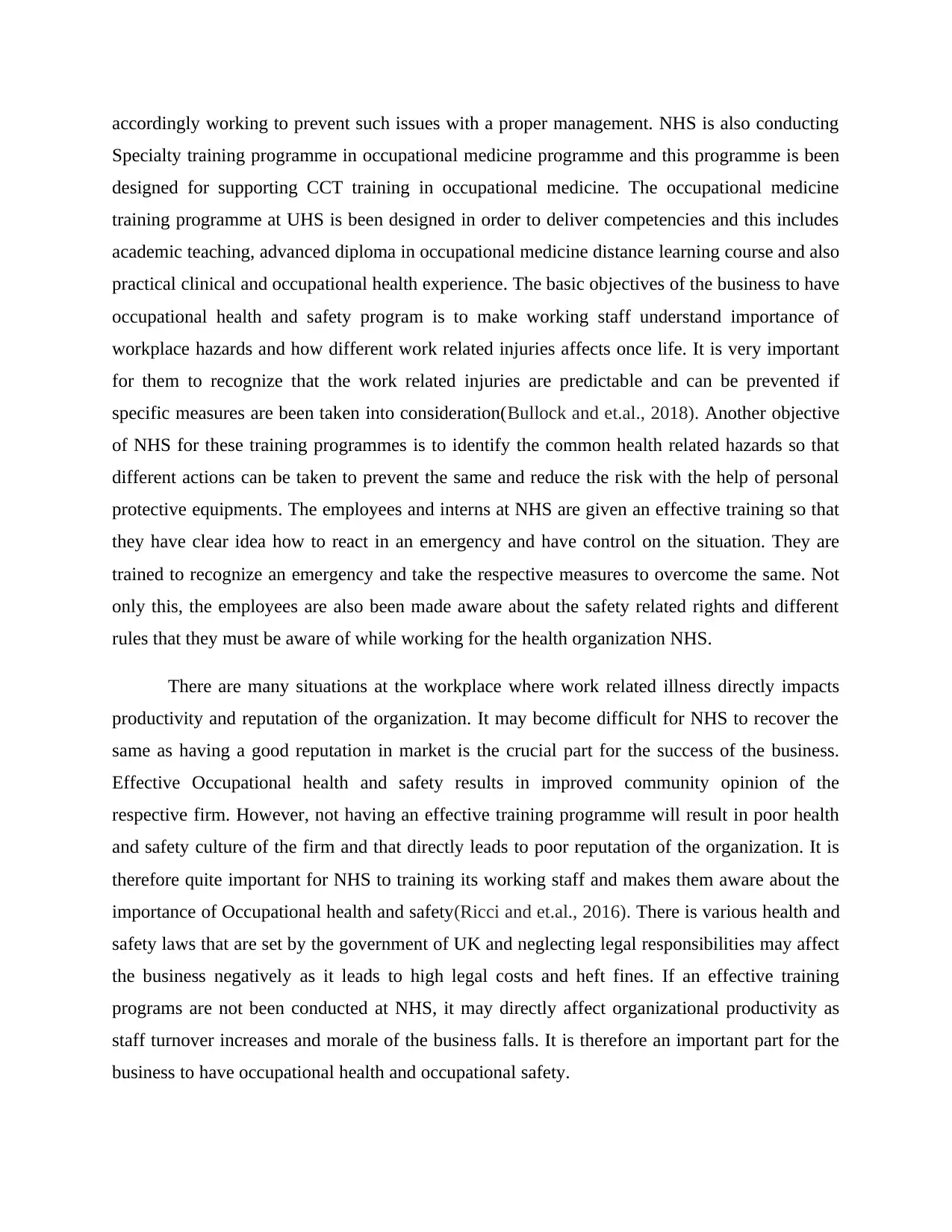
accordingly working to prevent such issues with a proper management. NHS is also conducting
Specialty training programme in occupational medicine programme and this programme is been
designed for supporting CCT training in occupational medicine. The occupational medicine
training programme at UHS is been designed in order to deliver competencies and this includes
academic teaching, advanced diploma in occupational medicine distance learning course and also
practical clinical and occupational health experience. The basic objectives of the business to have
occupational health and safety program is to make working staff understand importance of
workplace hazards and how different work related injuries affects once life. It is very important
for them to recognize that the work related injuries are predictable and can be prevented if
specific measures are been taken into consideration(Bullock and et.al., 2018). Another objective
of NHS for these training programmes is to identify the common health related hazards so that
different actions can be taken to prevent the same and reduce the risk with the help of personal
protective equipments. The employees and interns at NHS are given an effective training so that
they have clear idea how to react in an emergency and have control on the situation. They are
trained to recognize an emergency and take the respective measures to overcome the same. Not
only this, the employees are also been made aware about the safety related rights and different
rules that they must be aware of while working for the health organization NHS.
There are many situations at the workplace where work related illness directly impacts
productivity and reputation of the organization. It may become difficult for NHS to recover the
same as having a good reputation in market is the crucial part for the success of the business.
Effective Occupational health and safety results in improved community opinion of the
respective firm. However, not having an effective training programme will result in poor health
and safety culture of the firm and that directly leads to poor reputation of the organization. It is
therefore quite important for NHS to training its working staff and makes them aware about the
importance of Occupational health and safety(Ricci and et.al., 2016). There is various health and
safety laws that are set by the government of UK and neglecting legal responsibilities may affect
the business negatively as it leads to high legal costs and heft fines. If an effective training
programs are not been conducted at NHS, it may directly affect organizational productivity as
staff turnover increases and morale of the business falls. It is therefore an important part for the
business to have occupational health and occupational safety.
Specialty training programme in occupational medicine programme and this programme is been
designed for supporting CCT training in occupational medicine. The occupational medicine
training programme at UHS is been designed in order to deliver competencies and this includes
academic teaching, advanced diploma in occupational medicine distance learning course and also
practical clinical and occupational health experience. The basic objectives of the business to have
occupational health and safety program is to make working staff understand importance of
workplace hazards and how different work related injuries affects once life. It is very important
for them to recognize that the work related injuries are predictable and can be prevented if
specific measures are been taken into consideration(Bullock and et.al., 2018). Another objective
of NHS for these training programmes is to identify the common health related hazards so that
different actions can be taken to prevent the same and reduce the risk with the help of personal
protective equipments. The employees and interns at NHS are given an effective training so that
they have clear idea how to react in an emergency and have control on the situation. They are
trained to recognize an emergency and take the respective measures to overcome the same. Not
only this, the employees are also been made aware about the safety related rights and different
rules that they must be aware of while working for the health organization NHS.
There are many situations at the workplace where work related illness directly impacts
productivity and reputation of the organization. It may become difficult for NHS to recover the
same as having a good reputation in market is the crucial part for the success of the business.
Effective Occupational health and safety results in improved community opinion of the
respective firm. However, not having an effective training programme will result in poor health
and safety culture of the firm and that directly leads to poor reputation of the organization. It is
therefore quite important for NHS to training its working staff and makes them aware about the
importance of Occupational health and safety(Ricci and et.al., 2016). There is various health and
safety laws that are set by the government of UK and neglecting legal responsibilities may affect
the business negatively as it leads to high legal costs and heft fines. If an effective training
programs are not been conducted at NHS, it may directly affect organizational productivity as
staff turnover increases and morale of the business falls. It is therefore an important part for the
business to have occupational health and occupational safety.
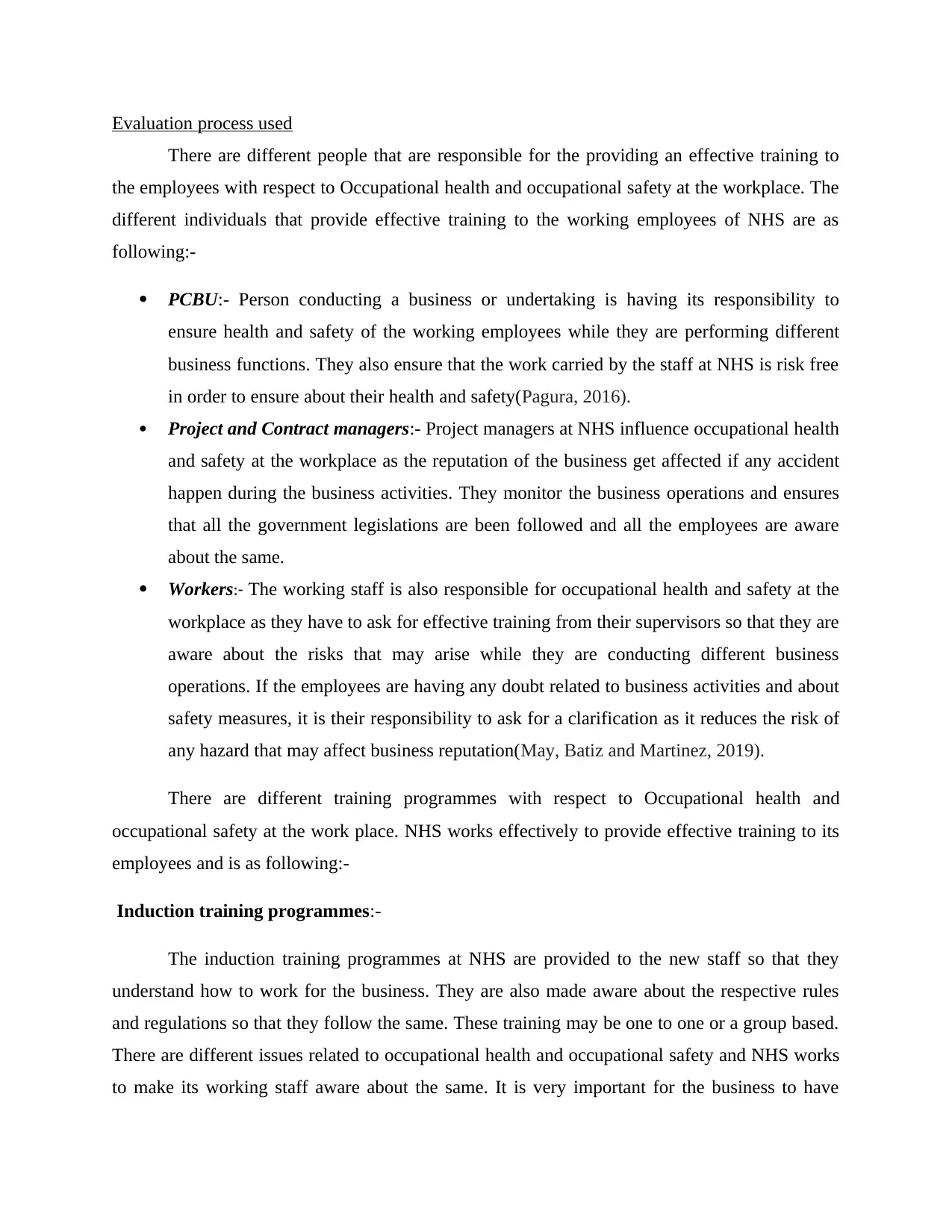
Evaluation process used
There are different people that are responsible for the providing an effective training to
the employees with respect to Occupational health and occupational safety at the workplace. The
different individuals that provide effective training to the working employees of NHS are as
following:-
PCBU:- Person conducting a business or undertaking is having its responsibility to
ensure health and safety of the working employees while they are performing different
business functions. They also ensure that the work carried by the staff at NHS is risk free
in order to ensure about their health and safety(Pagura, 2016).
Project and Contract managers:- Project managers at NHS influence occupational health
and safety at the workplace as the reputation of the business get affected if any accident
happen during the business activities. They monitor the business operations and ensures
that all the government legislations are been followed and all the employees are aware
about the same.
Workers:- The working staff is also responsible for occupational health and safety at the
workplace as they have to ask for effective training from their supervisors so that they are
aware about the risks that may arise while they are conducting different business
operations. If the employees are having any doubt related to business activities and about
safety measures, it is their responsibility to ask for a clarification as it reduces the risk of
any hazard that may affect business reputation(May, Batiz and Martinez, 2019).
There are different training programmes with respect to Occupational health and
occupational safety at the work place. NHS works effectively to provide effective training to its
employees and is as following:-
Induction training programmes:-
The induction training programmes at NHS are provided to the new staff so that they
understand how to work for the business. They are also made aware about the respective rules
and regulations so that they follow the same. These training may be one to one or a group based.
There are different issues related to occupational health and occupational safety and NHS works
to make its working staff aware about the same. It is very important for the business to have
There are different people that are responsible for the providing an effective training to
the employees with respect to Occupational health and occupational safety at the workplace. The
different individuals that provide effective training to the working employees of NHS are as
following:-
PCBU:- Person conducting a business or undertaking is having its responsibility to
ensure health and safety of the working employees while they are performing different
business functions. They also ensure that the work carried by the staff at NHS is risk free
in order to ensure about their health and safety(Pagura, 2016).
Project and Contract managers:- Project managers at NHS influence occupational health
and safety at the workplace as the reputation of the business get affected if any accident
happen during the business activities. They monitor the business operations and ensures
that all the government legislations are been followed and all the employees are aware
about the same.
Workers:- The working staff is also responsible for occupational health and safety at the
workplace as they have to ask for effective training from their supervisors so that they are
aware about the risks that may arise while they are conducting different business
operations. If the employees are having any doubt related to business activities and about
safety measures, it is their responsibility to ask for a clarification as it reduces the risk of
any hazard that may affect business reputation(May, Batiz and Martinez, 2019).
There are different training programmes with respect to Occupational health and
occupational safety at the work place. NHS works effectively to provide effective training to its
employees and is as following:-
Induction training programmes:-
The induction training programmes at NHS are provided to the new staff so that they
understand how to work for the business. They are also made aware about the respective rules
and regulations so that they follow the same. These training may be one to one or a group based.
There are different issues related to occupational health and occupational safety and NHS works
to make its working staff aware about the same. It is very important for the business to have
⊘ This is a preview!⊘
Do you want full access?
Subscribe today to unlock all pages.

Trusted by 1+ million students worldwide
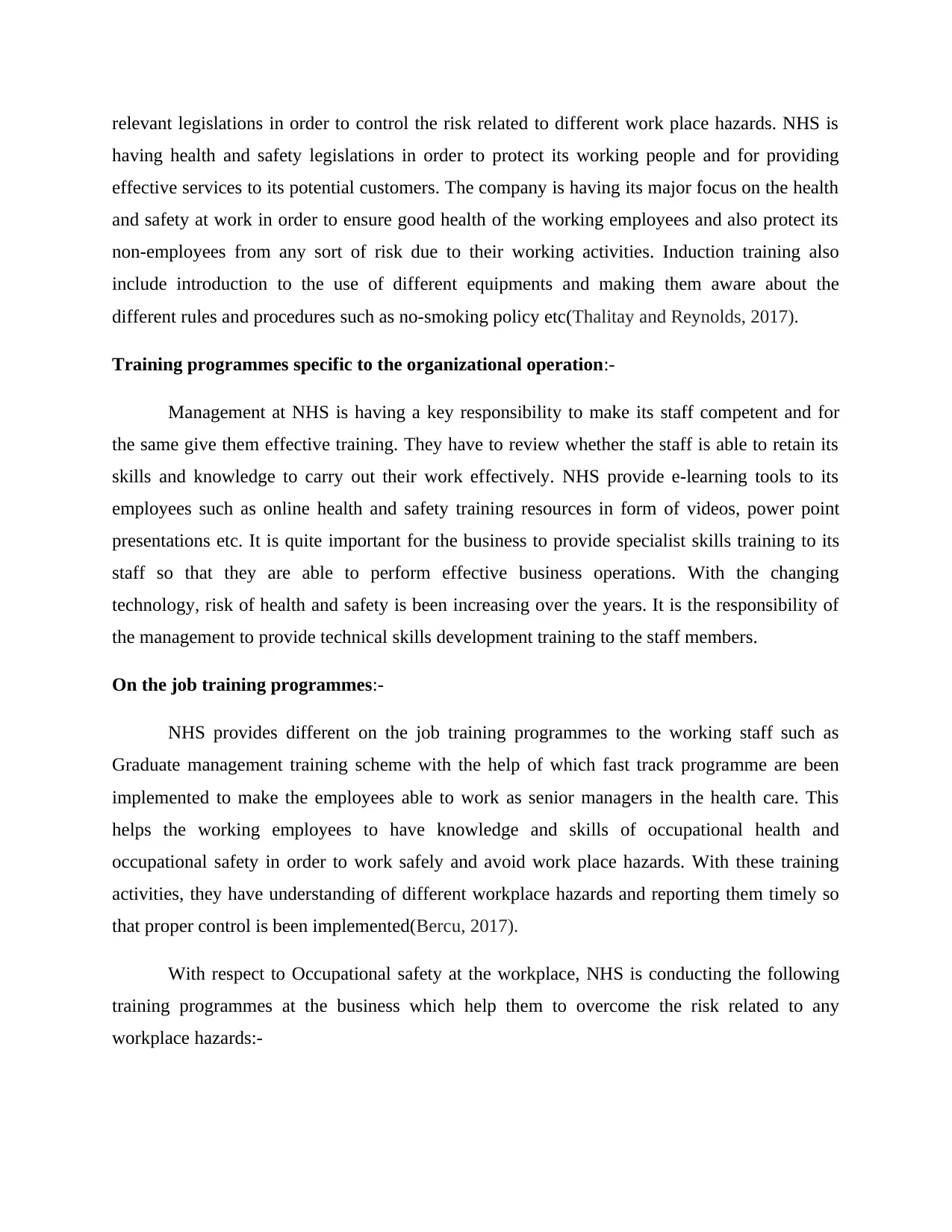
relevant legislations in order to control the risk related to different work place hazards. NHS is
having health and safety legislations in order to protect its working people and for providing
effective services to its potential customers. The company is having its major focus on the health
and safety at work in order to ensure good health of the working employees and also protect its
non-employees from any sort of risk due to their working activities. Induction training also
include introduction to the use of different equipments and making them aware about the
different rules and procedures such as no-smoking policy etc(Thalitay and Reynolds, 2017).
Training programmes specific to the organizational operation:-
Management at NHS is having a key responsibility to make its staff competent and for
the same give them effective training. They have to review whether the staff is able to retain its
skills and knowledge to carry out their work effectively. NHS provide e-learning tools to its
employees such as online health and safety training resources in form of videos, power point
presentations etc. It is quite important for the business to provide specialist skills training to its
staff so that they are able to perform effective business operations. With the changing
technology, risk of health and safety is been increasing over the years. It is the responsibility of
the management to provide technical skills development training to the staff members.
On the job training programmes:-
NHS provides different on the job training programmes to the working staff such as
Graduate management training scheme with the help of which fast track programme are been
implemented to make the employees able to work as senior managers in the health care. This
helps the working employees to have knowledge and skills of occupational health and
occupational safety in order to work safely and avoid work place hazards. With these training
activities, they have understanding of different workplace hazards and reporting them timely so
that proper control is been implemented(Bercu, 2017).
With respect to Occupational safety at the workplace, NHS is conducting the following
training programmes at the business which help them to overcome the risk related to any
workplace hazards:-
having health and safety legislations in order to protect its working people and for providing
effective services to its potential customers. The company is having its major focus on the health
and safety at work in order to ensure good health of the working employees and also protect its
non-employees from any sort of risk due to their working activities. Induction training also
include introduction to the use of different equipments and making them aware about the
different rules and procedures such as no-smoking policy etc(Thalitay and Reynolds, 2017).
Training programmes specific to the organizational operation:-
Management at NHS is having a key responsibility to make its staff competent and for
the same give them effective training. They have to review whether the staff is able to retain its
skills and knowledge to carry out their work effectively. NHS provide e-learning tools to its
employees such as online health and safety training resources in form of videos, power point
presentations etc. It is quite important for the business to provide specialist skills training to its
staff so that they are able to perform effective business operations. With the changing
technology, risk of health and safety is been increasing over the years. It is the responsibility of
the management to provide technical skills development training to the staff members.
On the job training programmes:-
NHS provides different on the job training programmes to the working staff such as
Graduate management training scheme with the help of which fast track programme are been
implemented to make the employees able to work as senior managers in the health care. This
helps the working employees to have knowledge and skills of occupational health and
occupational safety in order to work safely and avoid work place hazards. With these training
activities, they have understanding of different workplace hazards and reporting them timely so
that proper control is been implemented(Bercu, 2017).
With respect to Occupational safety at the workplace, NHS is conducting the following
training programmes at the business which help them to overcome the risk related to any
workplace hazards:-
Paraphrase This Document
Need a fresh take? Get an instant paraphrase of this document with our AI Paraphraser
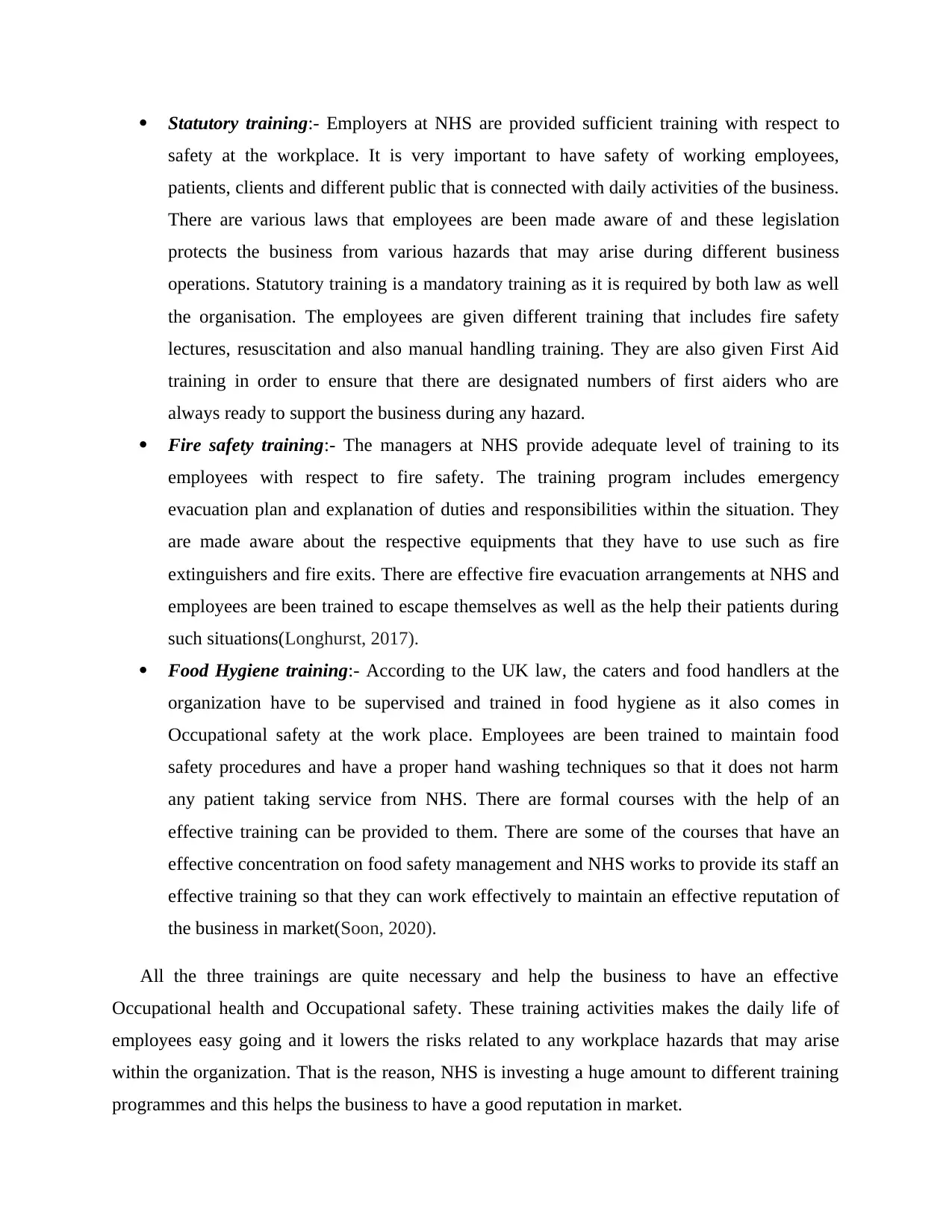
Statutory training:- Employers at NHS are provided sufficient training with respect to
safety at the workplace. It is very important to have safety of working employees,
patients, clients and different public that is connected with daily activities of the business.
There are various laws that employees are been made aware of and these legislation
protects the business from various hazards that may arise during different business
operations. Statutory training is a mandatory training as it is required by both law as well
the organisation. The employees are given different training that includes fire safety
lectures, resuscitation and also manual handling training. They are also given First Aid
training in order to ensure that there are designated numbers of first aiders who are
always ready to support the business during any hazard.
Fire safety training:- The managers at NHS provide adequate level of training to its
employees with respect to fire safety. The training program includes emergency
evacuation plan and explanation of duties and responsibilities within the situation. They
are made aware about the respective equipments that they have to use such as fire
extinguishers and fire exits. There are effective fire evacuation arrangements at NHS and
employees are been trained to escape themselves as well as the help their patients during
such situations(Longhurst, 2017).
Food Hygiene training:- According to the UK law, the caters and food handlers at the
organization have to be supervised and trained in food hygiene as it also comes in
Occupational safety at the work place. Employees are been trained to maintain food
safety procedures and have a proper hand washing techniques so that it does not harm
any patient taking service from NHS. There are formal courses with the help of an
effective training can be provided to them. There are some of the courses that have an
effective concentration on food safety management and NHS works to provide its staff an
effective training so that they can work effectively to maintain an effective reputation of
the business in market(Soon, 2020).
All the three trainings are quite necessary and help the business to have an effective
Occupational health and Occupational safety. These training activities makes the daily life of
employees easy going and it lowers the risks related to any workplace hazards that may arise
within the organization. That is the reason, NHS is investing a huge amount to different training
programmes and this helps the business to have a good reputation in market.
safety at the workplace. It is very important to have safety of working employees,
patients, clients and different public that is connected with daily activities of the business.
There are various laws that employees are been made aware of and these legislation
protects the business from various hazards that may arise during different business
operations. Statutory training is a mandatory training as it is required by both law as well
the organisation. The employees are given different training that includes fire safety
lectures, resuscitation and also manual handling training. They are also given First Aid
training in order to ensure that there are designated numbers of first aiders who are
always ready to support the business during any hazard.
Fire safety training:- The managers at NHS provide adequate level of training to its
employees with respect to fire safety. The training program includes emergency
evacuation plan and explanation of duties and responsibilities within the situation. They
are made aware about the respective equipments that they have to use such as fire
extinguishers and fire exits. There are effective fire evacuation arrangements at NHS and
employees are been trained to escape themselves as well as the help their patients during
such situations(Longhurst, 2017).
Food Hygiene training:- According to the UK law, the caters and food handlers at the
organization have to be supervised and trained in food hygiene as it also comes in
Occupational safety at the work place. Employees are been trained to maintain food
safety procedures and have a proper hand washing techniques so that it does not harm
any patient taking service from NHS. There are formal courses with the help of an
effective training can be provided to them. There are some of the courses that have an
effective concentration on food safety management and NHS works to provide its staff an
effective training so that they can work effectively to maintain an effective reputation of
the business in market(Soon, 2020).
All the three trainings are quite necessary and help the business to have an effective
Occupational health and Occupational safety. These training activities makes the daily life of
employees easy going and it lowers the risks related to any workplace hazards that may arise
within the organization. That is the reason, NHS is investing a huge amount to different training
programmes and this helps the business to have a good reputation in market.
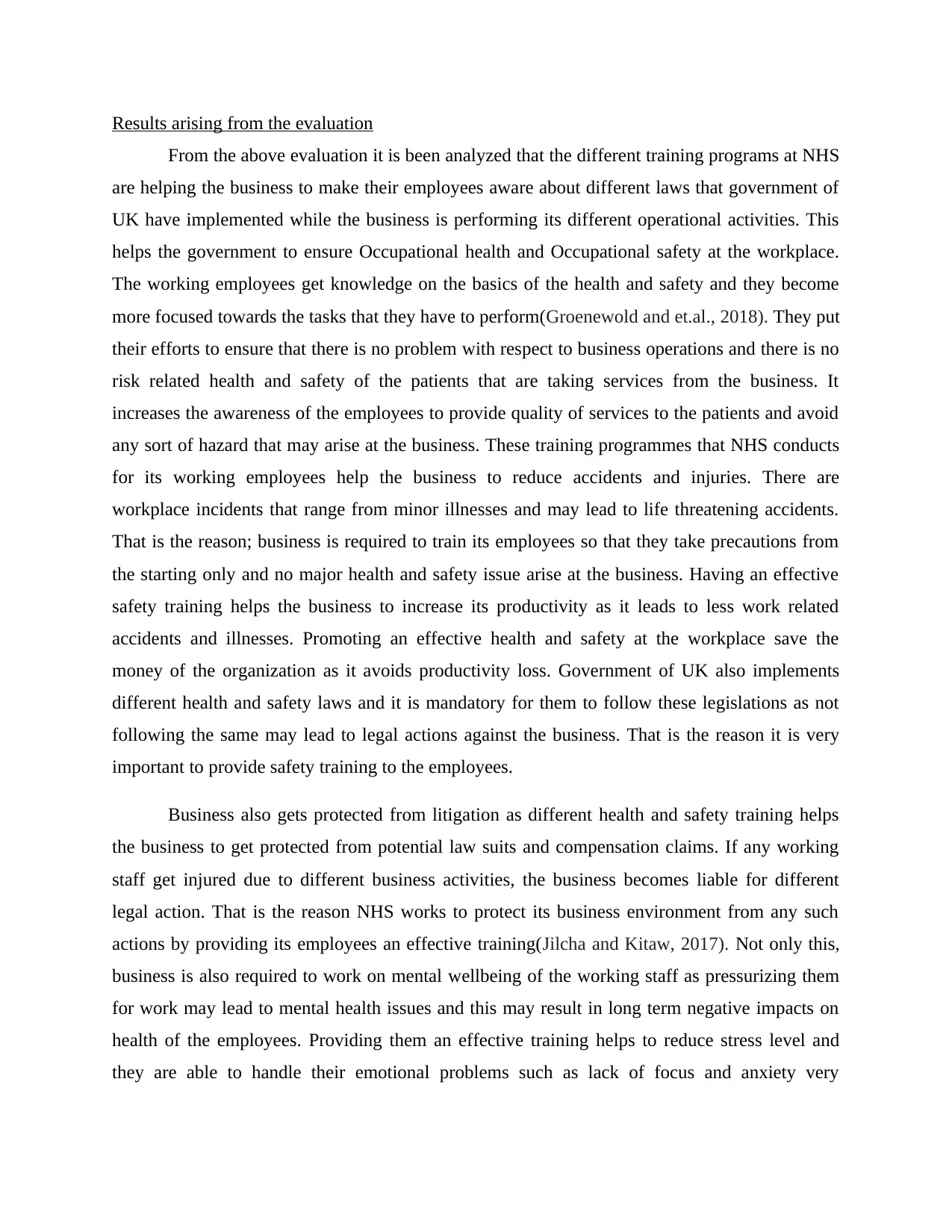
Results arising from the evaluation
From the above evaluation it is been analyzed that the different training programs at NHS
are helping the business to make their employees aware about different laws that government of
UK have implemented while the business is performing its different operational activities. This
helps the government to ensure Occupational health and Occupational safety at the workplace.
The working employees get knowledge on the basics of the health and safety and they become
more focused towards the tasks that they have to perform(Groenewold and et.al., 2018). They put
their efforts to ensure that there is no problem with respect to business operations and there is no
risk related health and safety of the patients that are taking services from the business. It
increases the awareness of the employees to provide quality of services to the patients and avoid
any sort of hazard that may arise at the business. These training programmes that NHS conducts
for its working employees help the business to reduce accidents and injuries. There are
workplace incidents that range from minor illnesses and may lead to life threatening accidents.
That is the reason; business is required to train its employees so that they take precautions from
the starting only and no major health and safety issue arise at the business. Having an effective
safety training helps the business to increase its productivity as it leads to less work related
accidents and illnesses. Promoting an effective health and safety at the workplace save the
money of the organization as it avoids productivity loss. Government of UK also implements
different health and safety laws and it is mandatory for them to follow these legislations as not
following the same may lead to legal actions against the business. That is the reason it is very
important to provide safety training to the employees.
Business also gets protected from litigation as different health and safety training helps
the business to get protected from potential law suits and compensation claims. If any working
staff get injured due to different business activities, the business becomes liable for different
legal action. That is the reason NHS works to protect its business environment from any such
actions by providing its employees an effective training(Jilcha and Kitaw, 2017). Not only this,
business is also required to work on mental wellbeing of the working staff as pressurizing them
for work may lead to mental health issues and this may result in long term negative impacts on
health of the employees. Providing them an effective training helps to reduce stress level and
they are able to handle their emotional problems such as lack of focus and anxiety very
From the above evaluation it is been analyzed that the different training programs at NHS
are helping the business to make their employees aware about different laws that government of
UK have implemented while the business is performing its different operational activities. This
helps the government to ensure Occupational health and Occupational safety at the workplace.
The working employees get knowledge on the basics of the health and safety and they become
more focused towards the tasks that they have to perform(Groenewold and et.al., 2018). They put
their efforts to ensure that there is no problem with respect to business operations and there is no
risk related health and safety of the patients that are taking services from the business. It
increases the awareness of the employees to provide quality of services to the patients and avoid
any sort of hazard that may arise at the business. These training programmes that NHS conducts
for its working employees help the business to reduce accidents and injuries. There are
workplace incidents that range from minor illnesses and may lead to life threatening accidents.
That is the reason; business is required to train its employees so that they take precautions from
the starting only and no major health and safety issue arise at the business. Having an effective
safety training helps the business to increase its productivity as it leads to less work related
accidents and illnesses. Promoting an effective health and safety at the workplace save the
money of the organization as it avoids productivity loss. Government of UK also implements
different health and safety laws and it is mandatory for them to follow these legislations as not
following the same may lead to legal actions against the business. That is the reason it is very
important to provide safety training to the employees.
Business also gets protected from litigation as different health and safety training helps
the business to get protected from potential law suits and compensation claims. If any working
staff get injured due to different business activities, the business becomes liable for different
legal action. That is the reason NHS works to protect its business environment from any such
actions by providing its employees an effective training(Jilcha and Kitaw, 2017). Not only this,
business is also required to work on mental wellbeing of the working staff as pressurizing them
for work may lead to mental health issues and this may result in long term negative impacts on
health of the employees. Providing them an effective training helps to reduce stress level and
they are able to handle their emotional problems such as lack of focus and anxiety very
⊘ This is a preview!⊘
Do you want full access?
Subscribe today to unlock all pages.

Trusted by 1+ million students worldwide
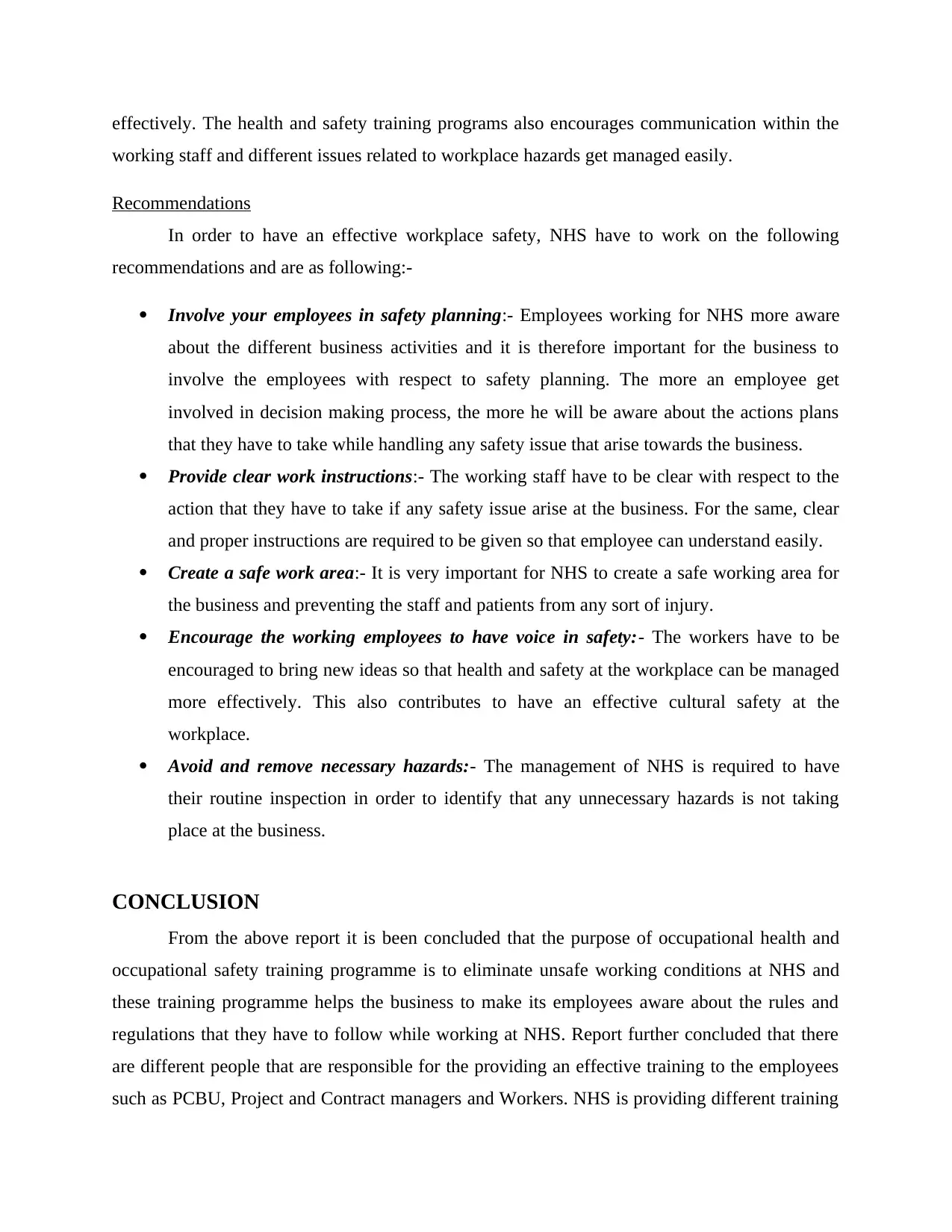
effectively. The health and safety training programs also encourages communication within the
working staff and different issues related to workplace hazards get managed easily.
Recommendations
In order to have an effective workplace safety, NHS have to work on the following
recommendations and are as following:-
Involve your employees in safety planning:- Employees working for NHS more aware
about the different business activities and it is therefore important for the business to
involve the employees with respect to safety planning. The more an employee get
involved in decision making process, the more he will be aware about the actions plans
that they have to take while handling any safety issue that arise towards the business.
Provide clear work instructions:- The working staff have to be clear with respect to the
action that they have to take if any safety issue arise at the business. For the same, clear
and proper instructions are required to be given so that employee can understand easily.
Create a safe work area:- It is very important for NHS to create a safe working area for
the business and preventing the staff and patients from any sort of injury.
Encourage the working employees to have voice in safety:- The workers have to be
encouraged to bring new ideas so that health and safety at the workplace can be managed
more effectively. This also contributes to have an effective cultural safety at the
workplace.
Avoid and remove necessary hazards:- The management of NHS is required to have
their routine inspection in order to identify that any unnecessary hazards is not taking
place at the business.
CONCLUSION
From the above report it is been concluded that the purpose of occupational health and
occupational safety training programme is to eliminate unsafe working conditions at NHS and
these training programme helps the business to make its employees aware about the rules and
regulations that they have to follow while working at NHS. Report further concluded that there
are different people that are responsible for the providing an effective training to the employees
such as PCBU, Project and Contract managers and Workers. NHS is providing different training
working staff and different issues related to workplace hazards get managed easily.
Recommendations
In order to have an effective workplace safety, NHS have to work on the following
recommendations and are as following:-
Involve your employees in safety planning:- Employees working for NHS more aware
about the different business activities and it is therefore important for the business to
involve the employees with respect to safety planning. The more an employee get
involved in decision making process, the more he will be aware about the actions plans
that they have to take while handling any safety issue that arise towards the business.
Provide clear work instructions:- The working staff have to be clear with respect to the
action that they have to take if any safety issue arise at the business. For the same, clear
and proper instructions are required to be given so that employee can understand easily.
Create a safe work area:- It is very important for NHS to create a safe working area for
the business and preventing the staff and patients from any sort of injury.
Encourage the working employees to have voice in safety:- The workers have to be
encouraged to bring new ideas so that health and safety at the workplace can be managed
more effectively. This also contributes to have an effective cultural safety at the
workplace.
Avoid and remove necessary hazards:- The management of NHS is required to have
their routine inspection in order to identify that any unnecessary hazards is not taking
place at the business.
CONCLUSION
From the above report it is been concluded that the purpose of occupational health and
occupational safety training programme is to eliminate unsafe working conditions at NHS and
these training programme helps the business to make its employees aware about the rules and
regulations that they have to follow while working at NHS. Report further concluded that there
are different people that are responsible for the providing an effective training to the employees
such as PCBU, Project and Contract managers and Workers. NHS is providing different training
Paraphrase This Document
Need a fresh take? Get an instant paraphrase of this document with our AI Paraphraser
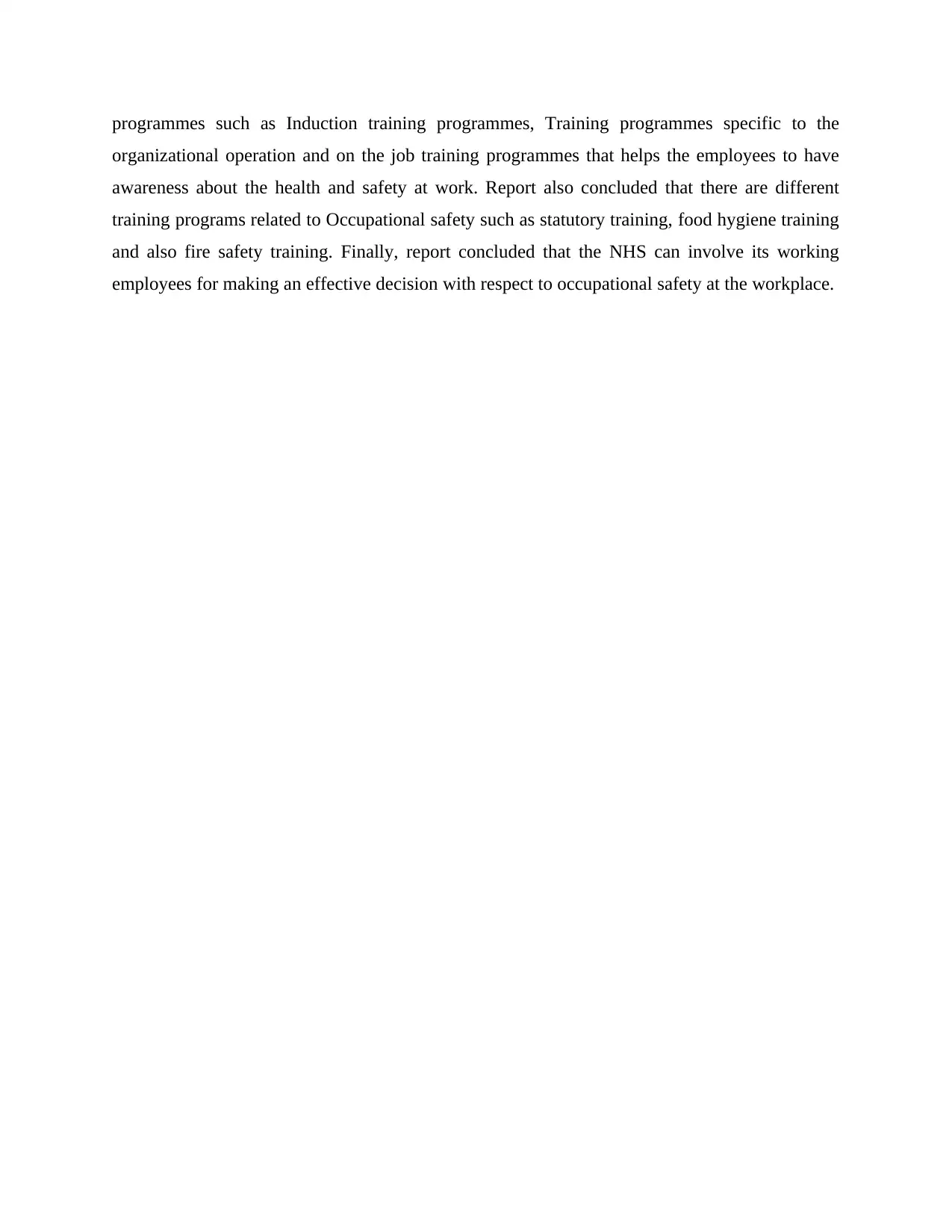
programmes such as Induction training programmes, Training programmes specific to the
organizational operation and on the job training programmes that helps the employees to have
awareness about the health and safety at work. Report also concluded that there are different
training programs related to Occupational safety such as statutory training, food hygiene training
and also fire safety training. Finally, report concluded that the NHS can involve its working
employees for making an effective decision with respect to occupational safety at the workplace.
organizational operation and on the job training programmes that helps the employees to have
awareness about the health and safety at work. Report also concluded that there are different
training programs related to Occupational safety such as statutory training, food hygiene training
and also fire safety training. Finally, report concluded that the NHS can involve its working
employees for making an effective decision with respect to occupational safety at the workplace.
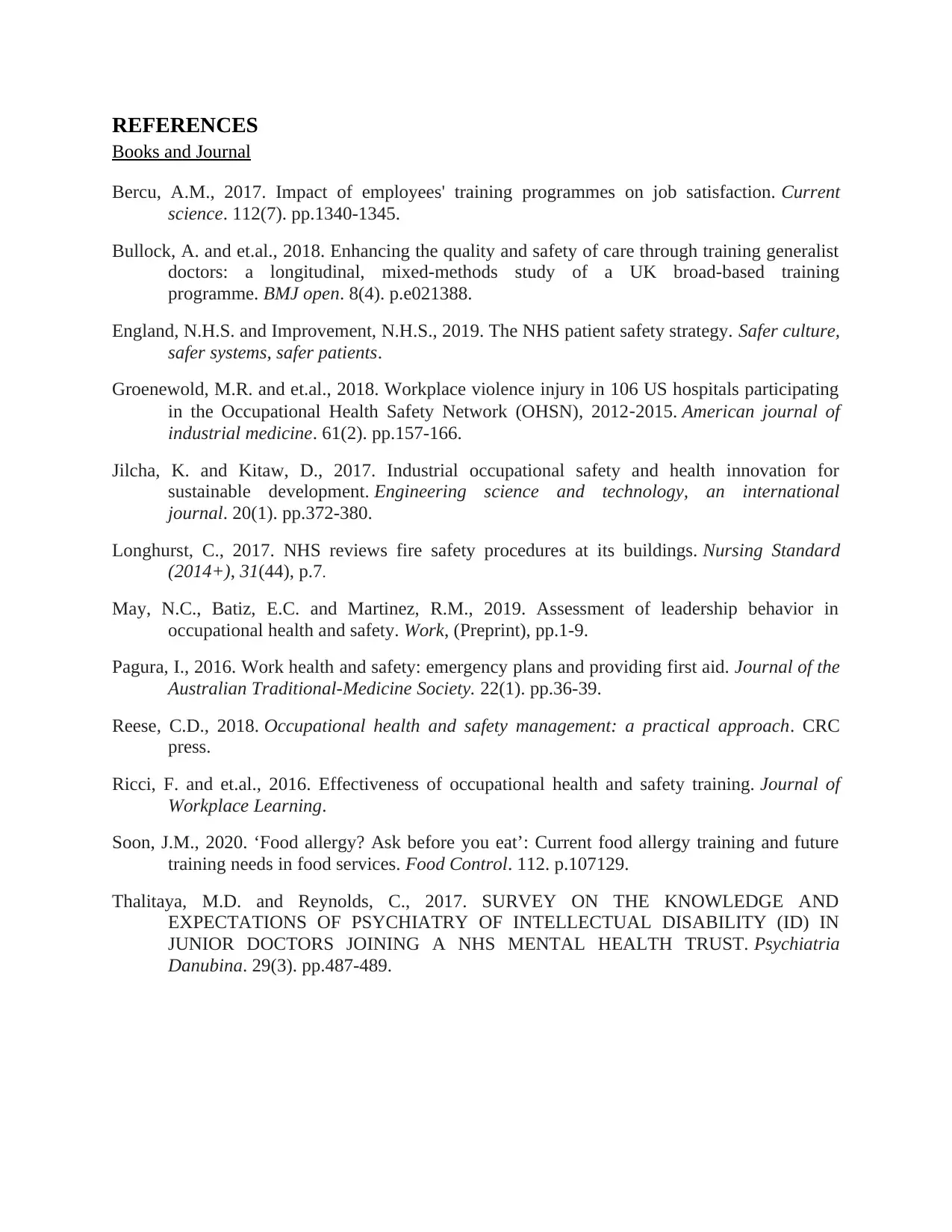
REFERENCES
Books and Journal
Bercu, A.M., 2017. Impact of employees' training programmes on job satisfaction. Current
science. 112(7). pp.1340-1345.
Bullock, A. and et.al., 2018. Enhancing the quality and safety of care through training generalist
doctors: a longitudinal, mixed-methods study of a UK broad-based training
programme. BMJ open. 8(4). p.e021388.
England, N.H.S. and Improvement, N.H.S., 2019. The NHS patient safety strategy. Safer culture,
safer systems, safer patients.
Groenewold, M.R. and et.al., 2018. Workplace violence injury in 106 US hospitals participating
in the Occupational Health Safety Network (OHSN), 2012‐2015. American journal of
industrial medicine. 61(2). pp.157-166.
Jilcha, K. and Kitaw, D., 2017. Industrial occupational safety and health innovation for
sustainable development. Engineering science and technology, an international
journal. 20(1). pp.372-380.
Longhurst, C., 2017. NHS reviews fire safety procedures at its buildings. Nursing Standard
(2014+), 31(44), p.7.
May, N.C., Batiz, E.C. and Martinez, R.M., 2019. Assessment of leadership behavior in
occupational health and safety. Work, (Preprint), pp.1-9.
Pagura, I., 2016. Work health and safety: emergency plans and providing first aid. Journal of the
Australian Traditional-Medicine Society. 22(1). pp.36-39.
Reese, C.D., 2018. Occupational health and safety management: a practical approach. CRC
press.
Ricci, F. and et.al., 2016. Effectiveness of occupational health and safety training. Journal of
Workplace Learning.
Soon, J.M., 2020. ‘Food allergy? Ask before you eat’: Current food allergy training and future
training needs in food services. Food Control. 112. p.107129.
Thalitaya, M.D. and Reynolds, C., 2017. SURVEY ON THE KNOWLEDGE AND
EXPECTATIONS OF PSYCHIATRY OF INTELLECTUAL DISABILITY (ID) IN
JUNIOR DOCTORS JOINING A NHS MENTAL HEALTH TRUST. Psychiatria
Danubina. 29(3). pp.487-489.
Books and Journal
Bercu, A.M., 2017. Impact of employees' training programmes on job satisfaction. Current
science. 112(7). pp.1340-1345.
Bullock, A. and et.al., 2018. Enhancing the quality and safety of care through training generalist
doctors: a longitudinal, mixed-methods study of a UK broad-based training
programme. BMJ open. 8(4). p.e021388.
England, N.H.S. and Improvement, N.H.S., 2019. The NHS patient safety strategy. Safer culture,
safer systems, safer patients.
Groenewold, M.R. and et.al., 2018. Workplace violence injury in 106 US hospitals participating
in the Occupational Health Safety Network (OHSN), 2012‐2015. American journal of
industrial medicine. 61(2). pp.157-166.
Jilcha, K. and Kitaw, D., 2017. Industrial occupational safety and health innovation for
sustainable development. Engineering science and technology, an international
journal. 20(1). pp.372-380.
Longhurst, C., 2017. NHS reviews fire safety procedures at its buildings. Nursing Standard
(2014+), 31(44), p.7.
May, N.C., Batiz, E.C. and Martinez, R.M., 2019. Assessment of leadership behavior in
occupational health and safety. Work, (Preprint), pp.1-9.
Pagura, I., 2016. Work health and safety: emergency plans and providing first aid. Journal of the
Australian Traditional-Medicine Society. 22(1). pp.36-39.
Reese, C.D., 2018. Occupational health and safety management: a practical approach. CRC
press.
Ricci, F. and et.al., 2016. Effectiveness of occupational health and safety training. Journal of
Workplace Learning.
Soon, J.M., 2020. ‘Food allergy? Ask before you eat’: Current food allergy training and future
training needs in food services. Food Control. 112. p.107129.
Thalitaya, M.D. and Reynolds, C., 2017. SURVEY ON THE KNOWLEDGE AND
EXPECTATIONS OF PSYCHIATRY OF INTELLECTUAL DISABILITY (ID) IN
JUNIOR DOCTORS JOINING A NHS MENTAL HEALTH TRUST. Psychiatria
Danubina. 29(3). pp.487-489.
⊘ This is a preview!⊘
Do you want full access?
Subscribe today to unlock all pages.

Trusted by 1+ million students worldwide
1 out of 12
Related Documents
Your All-in-One AI-Powered Toolkit for Academic Success.
+13062052269
info@desklib.com
Available 24*7 on WhatsApp / Email
![[object Object]](/_next/static/media/star-bottom.7253800d.svg)
Unlock your academic potential
Copyright © 2020–2026 A2Z Services. All Rights Reserved. Developed and managed by ZUCOL.




